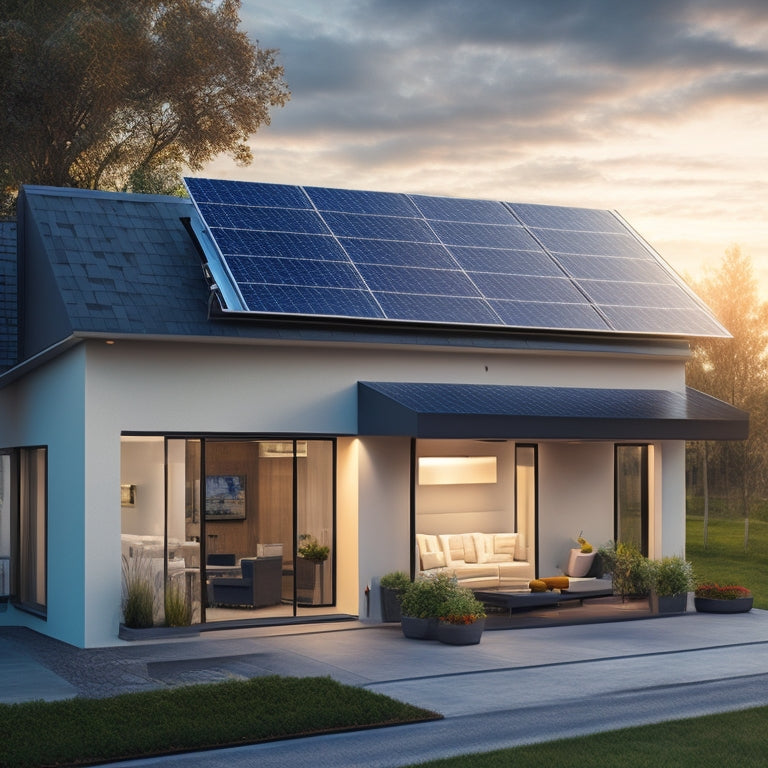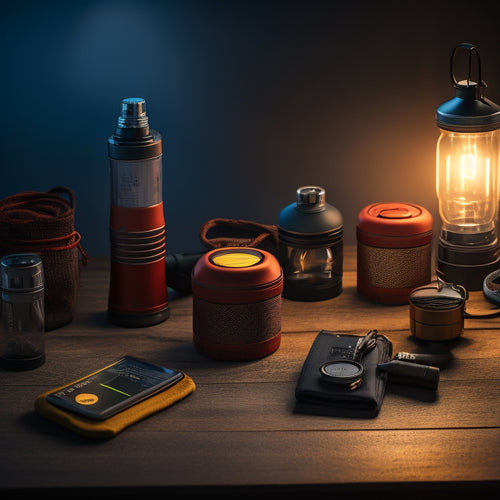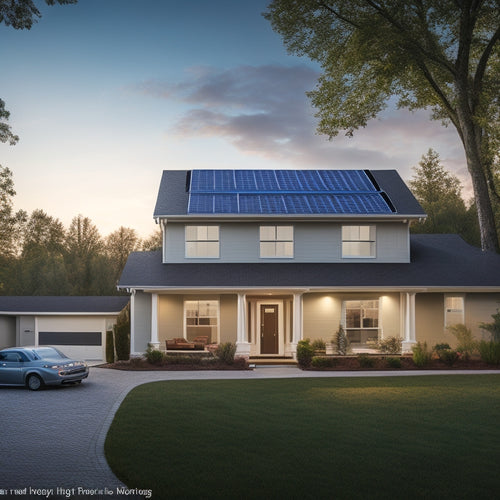
3 Best Home Power Systems With Battery Backup
Share
You're looking for a reliable home power system with battery backup to guarantee a steady supply of electricity. For urban homes, consider systems like Sonnen eco or SimpliPhi Power's PHI 3.4, which offer advanced monitoring and control systems. For rural areas, Rolls-Surrette Deep Cycle or OutBack Radian may be a better fit. When choosing a system, consider your unique energy needs, battery type, and depth of discharge. As you explore your options, you'll want to dig deeper into the specifics to find the ideal system for your lifestyle and budget.
Key Takeaways
• Consider Tesla Powerwall or LG Chem RESU for urban homes, and Rolls-Surrette Deep Cycle or OutBack Radian for rural areas.
• Assess energy needs to scale up or down the battery backup system, and consider unique requirements and preferences.
• Opt for deep cycle lead-acid, lithium-ion, or saltwater batteries, each with their pros and cons, such as cost, efficiency, and sustainability.
• Evaluate key battery metrics like depth of discharge, round-trip efficiency, and the battery management system for optimal performance.
• Ensure the system has advanced monitoring and control capabilities to optimize energy production and consumption for independence.
Top Picks for Homeowners
When selecting a home power system with battery backup, you'll want to explore systems that integrate seamlessly with your existing electrical infrastructure, such as the Tesla Powerwall or LG Chem RESU. These top picks for homeowners offer reliable and efficient energy storage solutions that cater to both urban dwellers and rural residents.
For urban dwellers, systems like the Sonnen eco or SimpliPhi Power's PHI 3.4 provide a compact and sleek design that can be easily installed in tight spaces. These systems are ideal for urban homes with limited space, allowing homeowners to store excess energy generated by rooftop solar panels or the grid during off-peak hours.
Rural residents, on the other hand, may prefer systems like the Rolls-Surrette Deep Cycle or the OutBack Radian, which are designed to provide extended backup power during prolonged outages. These systems are built to withstand harsh weather conditions and can be scaled up or down depending on the homeowner's energy needs.
Ultimately, the right home power system with battery backup will depend on your specific energy requirements and infrastructure. By considering your unique needs and preferences, you can find a system that provides reliable, efficient, and sustainable energy solutions for your home.
Systems for Off-Grid Living
You'll often find that systems for off-grid living require more robust and reliable energy storage solutions, capable of withstanding extreme weather conditions and providing prolonged power backup. This is because off-grid homes typically rely on renewable energy sources like solar or wind power, which can be intermittent.
To ensure a sustainable lifestyle, it's essential to have a battery backup system that can store excess energy generated during the day for use during the night or during periods of low energy production.
When selecting a system for off-grid living, consider the depth of discharge (DOD) and the number of charge cycles the battery can handle. A higher DOD and more charge cycles will provide a longer-lasting and more reliable energy storage solution.
Additionally, look for systems with advanced monitoring and control systems that can optimize energy production and consumption. By investing in a reliable and efficient energy storage system, you can enjoy the freedom and independence of an off-grid lifestyle while minimizing your carbon footprint.
Best Battery Backup Options
Your search for the best battery backup options begins with understanding the types of batteries that excel in off-grid systems, including deep cycle lead-acid, lithium-ion, and saltwater batteries, each with their unique advantages and limitations.
When evaluating these options, take into account the cost considerations that align with your energy needs. Deep cycle lead-acid batteries are a cost-effective choice, but they may require more maintenance and have a shorter lifespan. Lithium-ion batteries, on the other hand, offer higher energy efficiency and a longer lifespan, but come at a higher upfront cost. Saltwater batteries, a relatively new entrant, offer a sustainable and eco-friendly option, but their performance and durability are still being tested.
When choosing a battery backup option, it's crucial to take into account your energy requirements and the overall energy efficiency of the system. Look for batteries with high depth of discharge (DOD) and a high round-trip efficiency to minimize energy losses.
Additionally, consider the charging and discharging rates, as well as the battery management system (BMS) that guarantees safe and efficient operation. By carefully evaluating these factors, you can select the best battery backup option that meets your off-grid energy needs while minimizing costs and maximizing energy efficiency.
Frequently Asked Questions
How Do I Ensure a Seamless Transition to Battery Power During Outages?
When the grid fails, you'll guarantee a seamless switch to battery power by programming your system for load shedding, prioritizing essential loads, and optimizing grid independence to minimize disruptions to your daily routine.
Can I Use a Generator With My Home Power System?
Imagine your home humming along, uninterrupted, during an outage. Yes, you can use a generator with your system, but be sure to properly size it for your needs and prioritize fuel efficiency to minimize waste and maximize savings.
Are Home Power Systems With Battery Backup Diy-Installable?
When installing a home power system with battery backup, you'll likely need professional help to guarantee compliance with local regulations, especially when connecting to the grid or modifying your electrical panel.
Do Home Power Systems Work With Solar Panels?
As you harness the sun's energy, you'll find that home power systems seamlessly integrate with solar panels, optimizing Solar Panel Efficiency and Energy Harvesting to fuel your abode, ensuring a sustainable and reliable power supply.
Are There Any Rebates or Incentives for Home Power System Installations?
When you install a home power system, you're eligible for Federal incentives like the Solar Investment Tax Credit, offering 26% of total costs back, and State credits, which vary, so research your local options carefully.
Related Posts
-

Best Solar Powered Flashlights for Emergency Situations
When you're choosing the best solar-powered flashlights for emergency situations, focus on their brightness, battery ...
-

Cost of Solar With Battery Backup
You're investing in a solar panel system with battery backup to guarantee reliable power during outages. The cost of ...
-

Designing a Green Roof for Maximum Energy Efficiency
Designing a green roof for maximum energy efficiency involves several key strategies. Start by selecting native, drou...


